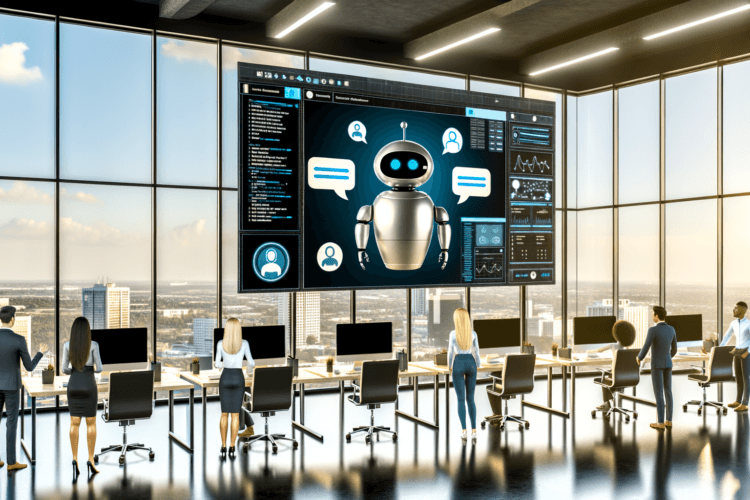
In the digital age, content is king. From blogs and social media posts to videos and podcasts, content fuels the internet. But as the demand for high-quality content increases, so does the challenge of producing it efficiently and effectively. Enter Artificial Intelligence (AI), a transformative technology that is revolutionizing the content creation landscape. In this comprehensive guide, we will explore the power of AI in content creation, examining how it is reshaping the industry, the tools available, and what the future holds.
Introduction to AI in Content Creation
Artificial Intelligence has been making waves across various industries, and content creation is no exception. AI in content creation refers to the use of advanced algorithms and machine learning techniques to generate, optimize, and personalize content. This powerful technology not only enhances the efficiency of content production but also improves its quality and relevance.
The evolution of AI has led to sophisticated content creation tools that can assist or even autonomously create content. These tools analyze data, learn from patterns, and generate creative outputs that match human-like quality. As a result, businesses and content creators can keep up with the ever-growing demand for fresh and engaging content.
The Rise of AI in Content Creation
Historical Context
To understand the impact of AI in content creation, it’s essential to look at its historical development. Initially, AI’s role in content creation was limited to basic tasks like grammar checks or data analysis. However, as machine learning and natural language processing (NLP) evolved, so did AI’s capabilities in content creation.
Today, AI can generate entire articles, design graphics, create videos, and even compose music. This transformation is fueled by advancements in technology and the increasing availability of data, enabling AI to learn and mimic human creativity more accurately.
The Driving Factors
Several factors have contributed to the rise of AI in content creation:
- Data Explosion: The digital world is inundated with data. AI can analyze vast amounts of information quickly, deriving insights and generating content based on these insights.
- Demand for Personalization: Consumers expect personalized content that caters to their preferences. AI can tailor content to individual tastes, increasing engagement and conversion rates.
- Efficiency and Cost-effectiveness: AI can automate repetitive tasks, reducing the time and cost associated with content creation. This allows creators to focus on more strategic activities.
- Technological Advancements: Improvements in AI algorithms, computing power, and cloud technology have made sophisticated AI tools accessible to a broader audience.
How AI is Transforming Content Creation
AI’s impact on content creation is multifaceted, affecting various aspects of the process, from ideation to distribution. Let’s delve into how AI is transforming each stage of content creation.
Ideation and Research
AI can enhance the brainstorming process by generating content ideas based on trends, keywords, and audience preferences. Tools like BuzzSumo and HubSpot’s Content Strategy Tool leverage AI to suggest topics that are likely to resonate with the target audience.
Furthermore, AI-driven analytics platforms can process large datasets to identify trending topics, analyze competitors, and uncover content gaps. This data-driven approach ensures that content creators focus on ideas with the highest potential impact.
Content Generation
AI-powered content generation tools, such as OpenAI’s GPT-3, can write articles, create social media posts, and draft emails with minimal human intervention. These tools use natural language processing to understand context and generate human-like text.
While AI can produce content autonomously, it works best when combined with human oversight. AI-generated content can serve as a draft or inspiration, allowing writers to refine and add a personal touch.
Visual Content Creation
AI is not limited to text; it is also revolutionizing visual content creation. Tools like Canva and Piktochart incorporate AI to suggest design elements, layouts, and color schemes. AI can even generate original images through platforms like DALL-E, which uses deep learning to create artwork based on textual descriptions.
Video content is another area where AI shines. Tools like Lumen5 and Magisto use AI to transform text-based content into engaging videos, selecting appropriate visuals, music, and transitions automatically.
Content Optimization
SEO is critical for content visibility, and AI plays a pivotal role in optimizing content for search engines. AI tools like Clearscope and MarketMuse analyze top-ranking content to suggest keywords, topic clusters, and content structure improvements.
Moreover, AI can personalize content for different audience segments. Platforms like Dynamic Yield use machine learning to tailor website content, emails, and ads to individual user preferences, enhancing user experience and engagement.
Editing and Proofreading
AI-driven editing tools such as Grammarly and Hemingway Editor assist writers in refining their content by checking grammar, style, and readability. These tools use NLP to provide suggestions, making the editing process faster and more efficient.
Distribution and Performance Analysis
AI can automate content distribution across various platforms, ensuring that the right content reaches the right audience at the optimal time. Social media management tools like Buffer and Hootsuite leverage AI to schedule posts and analyze engagement, providing insights for future content strategies.
Performance analysis is another area where AI excels. Analytics platforms like Google Analytics use machine learning to track content performance, identify trends, and provide actionable insights, helping creators refine their strategies.
Benefits of Using AI in Content Creation
The integration of AI in content creation offers numerous benefits, including:
- Increased Efficiency: AI automates repetitive tasks, freeing up time for content creators to focus on strategic planning and creativity.
- Enhanced Creativity: AI can generate new ideas, suggesting novel approaches and concepts that creators might not have considered.
- Improved Accuracy: AI-driven tools reduce the likelihood of errors in grammar, style, and formatting, ensuring high-quality content.
- Scalability: AI enables content creators to produce more content in less time, meeting the growing demand for fresh and relevant material.
- Data-Driven Insights: AI analyzes vast amounts of data to provide insights into audience preferences and content performance, informing more effective content strategies.
- Personalization: AI tailors content to individual user preferences, enhancing engagement and conversion rates.
Challenges and Limitations of AI in Content Creation
Despite its advantages, AI in content creation is not without challenges and limitations:
Lack of Human Touch
While AI can generate content that mimics human writing, it often lacks the emotional depth and creativity inherent in human expression. AI-generated content may come across as formulaic or impersonal, which can detract from its effectiveness.
Ethical Concerns
The use of AI in content creation raises ethical concerns, particularly regarding authorship and the potential for misinformation. As AI-generated content becomes more prevalent, distinguishing between human and machine-generated content may become challenging.
Dependence on Data Quality
AI’s effectiveness depends on the quality of the data it processes. Inaccurate or biased data can lead to flawed content generation, affecting its relevance and reliability.
Complexity and Cost
Implementing AI tools can be complex and costly, particularly for small businesses and individual creators. While many AI tools offer free versions, advanced features often require investment.
Creative Limitations
AI excels at generating content based on existing patterns and data, but it may struggle with highly creative or abstract concepts. Human creativity remains unmatched in areas requiring deep imagination and innovation.
Popular AI Tools for Content Creation
The landscape of AI-powered content creation tools is vast and continually expanding. Here are some popular tools that are making waves in the industry:
Text Generation
- OpenAI’s GPT-3: A state-of-the-art language model capable of generating human-like text for blogs, articles, and more.
- Jarvis (now Jasper): An AI writing assistant that helps create marketing copy, blog posts, and social media content.
Visual Content
- Canva: A graphic design platform that uses AI to suggest design elements and layouts.
- DALL-E: An AI model that generates original images from textual descriptions.
Video Creation
- Lumen5: A tool that transforms text-based content into engaging videos using AI.
- Magisto: An AI-driven video editor that automatically selects the best parts of your footage to create compelling videos.
Content Optimization
- Clearscope: An SEO tool that uses AI to suggest keywords and content improvements.
- MarketMuse: A content strategy platform that provides AI-driven insights for content optimization.
Editing and Proofreading
- Grammarly: An AI-powered writing assistant that checks grammar, style, and readability.
- Hemingway Editor: A tool that highlights complex sentences and suggests improvements for clarity.
The Future of AI in Content Creation
As AI technology continues to advance, its role in content creation is set to expand further. Here are some trends to watch for in the future:
Increased Collaboration Between Humans and AI
The future of content creation will likely involve a collaborative approach, where AI assists humans in generating content while humans provide the creative touch and emotional depth. This collaboration will enhance both the efficiency and quality of content produced.
Greater Personalization
AI’s ability to analyze data and predict user preferences will lead to even more personalized content experiences. Content creators will leverage AI to deliver hyper-targeted content that resonates with individual users, increasing engagement and loyalty.
Ethical AI Practices
As the use of AI in content creation grows, so will the focus on ethical practices. Ensuring transparency, accountability, and fairness in AI algorithms will be crucial to maintaining trust and credibility.
Advanced Content Formats
AI will drive the development of new content formats, such as interactive and immersive experiences. Virtual reality, augmented reality, and interactive storytelling are areas where AI can enhance user engagement and offer unique content experiences.
Improved Content Quality
Continuous advancements in AI algorithms will lead to even higher quality content. AI will become better at understanding context, tone, and nuances, resulting in more sophisticated and polished outputs.
Conclusion
The power of AI in content creation is undeniable. From generating ideas and producing content to optimizing and distributing it, AI is transforming every aspect of the content creation process. By embracing AI, content creators can enhance efficiency, creativity, and personalization, meeting the ever-growing demand for high-quality content.
However, it’s essential to approach AI in content creation with a balanced perspective, recognizing both its potential and its limitations. By combining the strengths of AI with human creativity and ethical considerations, the future of content creation promises to be both innovative and impactful.
As AI continues to evolve, staying informed and adaptable will be key to leveraging its full potential. Whether you’re a seasoned content creator or just starting, embracing AI can open new avenues for creativity and success in the digital world.




